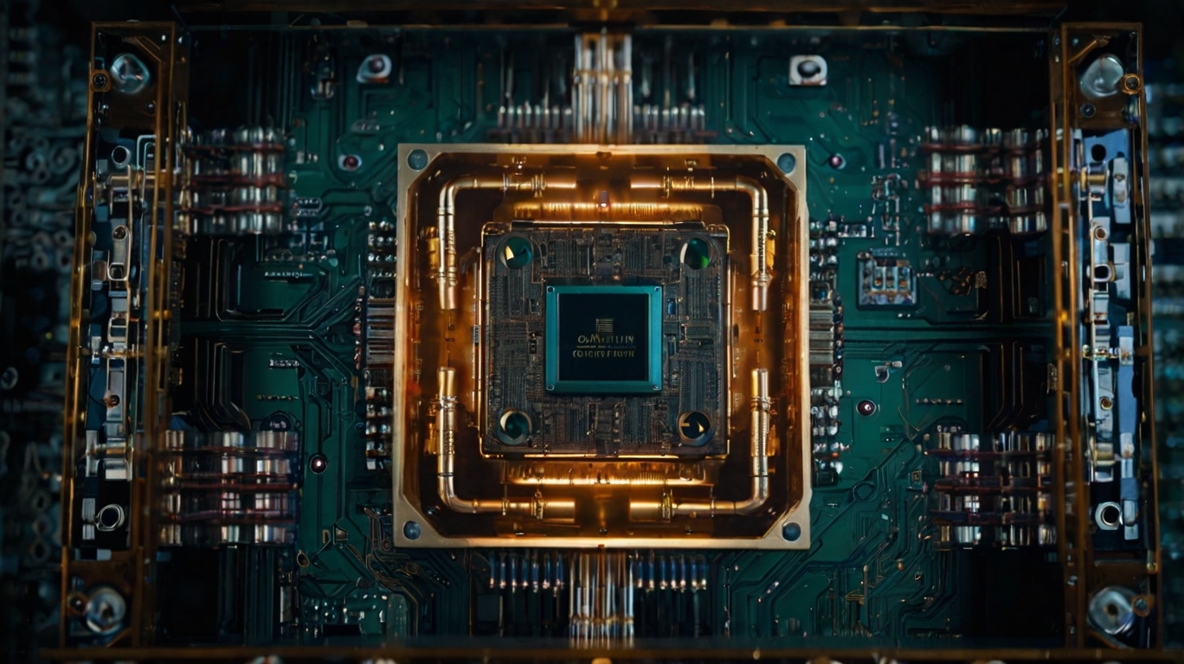Introduction to Quantum Computing
Imagine a computer that can solve problems in seconds that would take traditional computers thousands of years. This may sound like science fiction, but it’s becoming a reality, thanks to Quantum Computing What It Is and How It Works. A rapidly evolving field, quantum computing promises to revolutionize the world of technology by performing complex calculations that are currently out of reach for conventional computers. If you’re wondering how it works and what makes it so powerful, you’re in the right place. In this article, we’ll explain Quantum Computing What It Is and How It Works, and explore its potential to transform industries across the globe.
What is Quantum Computing?
At the heart of quantum computing is a radical departure from how traditional computers function. Classical computers process data in bits, which represent either a 0 or a 1. This binary system is the backbone of nearly all computing tasks today. However, quantum computers use qubits (quantum bits), which can represent both 0 and 1 simultaneously, thanks to the principles of quantum mechanics.
This ability to exist in multiple states at once is known as superposition and is one of the key differences between classical and quantum computing. It opens up new possibilities for processing and solving problems more efficiently than ever before.
Quantum computing isn’t just about performing more calculations faster; it’s about approaching problems from a completely different angle—one that classical computers simply can’t handle.
Classical vs. Quantum Computing
| Classical Computer | Quantum Computer |
|---|---|
| Uses bits (0s and 1s) for information | Uses qubits, which can be 0, 1, or both at the same time |
| Sequential processing of tasks | Can process many tasks at once through superposition |
| Limited processing capacity for certain complex problems | Can solve certain problems exponentially faster using quantum algorithms |
Top Startup Trends to Watch in 2025 | Key Insights for Success
Key Principles of Quantum Computing
Quantum computing is based on several foundational principles from quantum mechanics. These principles not only set quantum computers apart from classical computers but also give them their extraordinary potential.
Superposition: The Magic of Multiple States
In a traditional computer, a bit is either a 0 or a 1. But with superposition, a qubit can exist in a state that is both 0 and 1 simultaneously. It’s a bit like flipping a coin and having it land on both heads and tails at the same time. This allows quantum computers to handle a vast amount of information at once and perform complex computations much faster than classical systems.
For example, when a quantum computer processes data, it can perform multiple calculations in parallel, exploring different possibilities simultaneously. This gives quantum computing its power to solve problems exponentially faster than traditional computing.
Entanglement: A Powerful Connection Between Qubits
Another cornerstone of quantum computing is entanglement, a phenomenon where qubits become linked in such a way that the state of one qubit is directly related to the state of another, regardless of how far apart they are. This strange connection allows quantum computers to perform highly synchronized operations, amplifying their computational power.
When qubits are entangled, they work together in a way that classical bits cannot. This makes quantum computers highly efficient at solving problems that require coordination between many variables.
Quantum Interference: The Art of Reinforcing the Right Answer
Quantum interference is another concept that plays a key role in quantum computing. When qubits are manipulated, they interact with each other in ways that either reinforce or cancel out certain outcomes. Through careful control of quantum interference, quantum algorithms can be designed to amplify the probability of the correct answer while minimizing incorrect ones.
This is similar to the way waves interact with each other—when waves meet at the right moment, they combine to form a stronger wave. In quantum computing, this interaction helps find solutions more effectively by focusing on the correct paths.
How Quantum Computing Works
Quantum computing operates on the same general principles as classical computing—through processing and manipulating information. However, because it uses qubits instead of bits, the operations are much more complex. Quantum computers utilize quantum gates to manipulate qubits, similar to how classical computers use logic gates to process bits.
Here’s a simple way to understand how it works:
- Qubits are initialized in a known state (usually 0).
- Quantum gates manipulate these qubits by flipping them, changing their state, or entangling them with others.
- Quantum algorithms like Shor’s Algorithm or Grover’s Algorithm are applied to solve specific problems, using quantum mechanics to speed up calculations.
- Finally, the quantum computer performs measurements, collapsing the qubits into a final state and producing the result.
This process might sound complicated, but it allows quantum computers to perform many operations at once, giving them the power to solve certain problems far faster than classical computers.

Why Does Quantum Computing Matter?
The potential of quantum computing is vast, and while it’s still early days, the implications are enormous. Here are a few areas where quantum computing could drastically change the game:
1. Cryptography and Cybersecurity
One of the most widely discussed impacts of quantum computing is its effect on encryption. Quantum computers could break traditional encryption methods, like RSA, by quickly factoring large numbers—something classical computers can’t do in a feasible amount of time. This has led to an increased focus on quantum-safe encryption, which aims to secure data against quantum attacks.
2. Artificial Intelligence (AI) and Machine Learning (ML)
Quantum computing could drastically speed up certain AI and machine learning algorithms by processing large datasets and performing complex calculations in parallel. For instance, quantum algorithms could potentially train AI models much faster, enabling more advanced AI systems that can solve problems that were previously too complex.
3. Drug Discovery and Healthcare
One of the most promising applications of quantum computing lies in the field of healthcare, specifically drug discovery. Quantum computers can simulate molecular structures and interactions at a quantum level, potentially accelerating the development of new medicines and treatments for diseases like cancer, Alzheimer’s, and more.
4. Optimization and Logistics
Quantum computing is also poised to revolutionize optimization problems in various industries, from logistics and transportation to finance and manufacturing. For example, quantum algorithms could help businesses optimize supply chains, predict stock market trends, or design better manufacturing processes.
5. Climate Modeling and Environmental Protection
Quantum computing could make a significant impact on climate change modeling and sustainability efforts. By simulating complex climate systems with greater accuracy, quantum computers could help scientists predict environmental changes more effectively and find solutions for renewable energy sources, climate adaptation, and carbon capture technologies.
Challenges Facing Quantum Computing
While the potential of quantum computing is incredibly exciting, it’s important to recognize the challenges the field still faces. Here are some of the major hurdles:
1. Qubit Stability and Error Rates
Qubits are extremely sensitive to their environment and prone to errors. They can easily be affected by things like temperature, electromagnetic radiation, and even small vibrations. Researchers are working to improve the stability of qubits to make them more reliable.
2. Scalability
Most quantum computers today have just a few dozen qubits, but for quantum computing to reach its full potential, we’ll need machines with thousands, if not millions, of qubits. Building these large-scale quantum computers is a major technical challenge that requires advances in both hardware and software.
3. Quantum Programming and Software Development
Programming for quantum computers is vastly different from traditional computing. Quantum algorithms require a deep understanding of quantum mechanics and specialized programming languages. Developing accessible and efficient quantum software is an ongoing challenge.
The Future of Quantum Computing
Despite these challenges, quantum computing is advancing rapidly. Companies like IBM, Google, and Microsoft are pouring resources into quantum research, and many startups are working on developing quantum hardware and software. In the coming years, we can expect to see quantum computers tackling increasingly complex problems, from simulating molecules for drug discovery to optimizing global supply chains.
Quantum computers will also likely be used in combination with classical computers, creating hybrid quantum-classical systems. These systems will allow businesses and researchers to access the power of quantum computing while still leveraging the stability and reliability of traditional computing.
In the not-too-distant future, quantum computing could redefine what’s possible in fields like cryptography, AI, healthcare, and beyond.
Conclusion
Quantum computing is no longer just a theoretical concept confined to the realms of physicists. It’s becoming a practical reality that could transform how we approach some of the world’s most complex problems. From breaking new ground in AI and cybersecurity to revolutionizing healthcare and climate science, the potential applications of quantum computing are vast and incredibly exciting.
Although the field is still in its early stages, the rapid progress being made by researchers and companies suggests that quantum computing will soon be able to deliver solutions to problems that traditional computers simply cannot. As the technology advances, it will continue to open new frontiers in science, business, and everyday life, changing the way we think about computation and problem-solving forever.
Now that you understand the basics of quantum computing, it’s clear that this technology holds the key to the future. As we move toward a new era in computing, the possibilities are endless. Keep an eye on quantum computing—you may be witnessing the dawn of a new age in technology.



